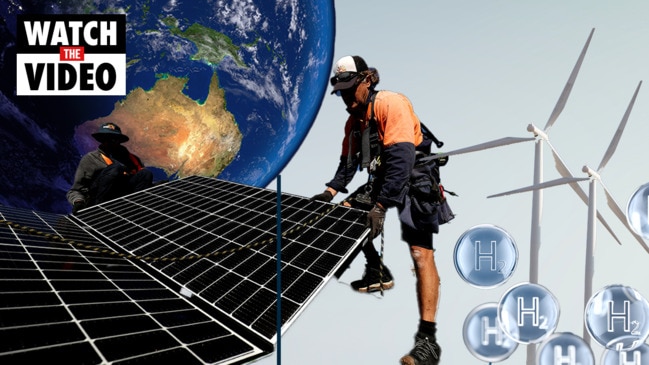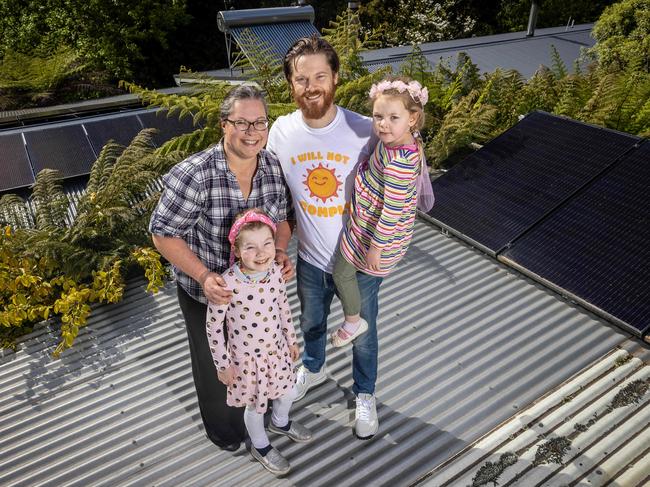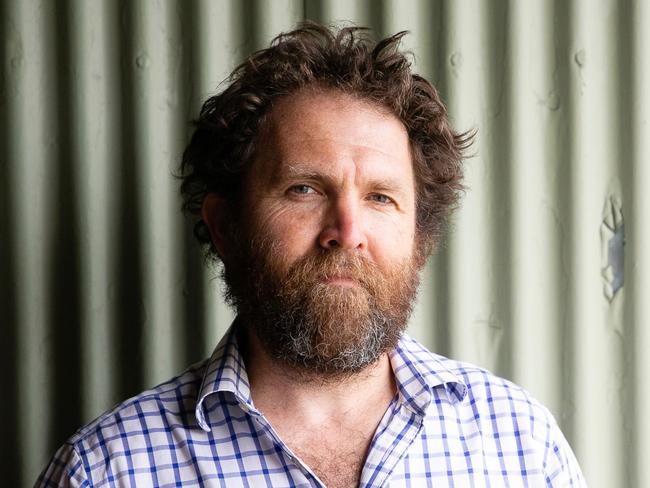How going net zero will save Victorians money on energy bills
Victorians can make simple, fast changes to their energy usage and petrol bills by choosing greener ways to live.

Environment
Don't miss out on the headlines from Environment. Followed categories will be added to My News.
Victorians could save almost 50c every time they have a shower, slash their heating costs by two-thirds and make a cup of tea for just one cent, astonishing new research shows.
The analysis, commissioned by The Herald Sun, also reveals car fuel costs could be cut by more than half after households are converted to renewable energy.
The research breaks down figures contained in the newly released Rewiring Australia report by globally renowned Australian energy guru Saul Griffith, who is now an energy adviser to the US government.
Rewiring Australia found that by 2030, the average Australian household could save $5,000 to $6,000 a year on energy and vehicle costs compared to now by replacing gas and coal-fired electricity with renewable power augmented by heat pumps.
But the breakdown commissioned by the Herald Sun reveals that consumers could in fact see massive savings by 2025, especially if they are using solar power – which is now increasingly available with no-upfront cost.

This includes slashing the cost of home heating from an average of $1.98 a day with gas to
just 59c a day with an electric heat pump powered by solar.
Average car fuel costs would also be cut from 12c a kilometre for a petrol vehicle to just 5c per kilometre for an electric vehicle.
The analysis has even broken down the cost of having a “luxurious shower”, showing it would drop from an average of 66c with gas hot water to just 20 cents with a solar powered heat pump.
And the cost of making a cup of tea would fall from an average of 9c if boiled on a gas stove or 6c with an electric kettle to just 1c under financed solar power.
Dr Griffith, the founder and chief scientist of energy advisory firm Otherlab, said the transformation of suburban power supply would not just cut costs but also be a massive economic and employment boost.
“Rewiring our castles and cars is an enormous opportunity to demolish our power and petrol bills and generate tens of thousands of jobs for tradies,” he said.
“We need to grasp this opportunity. And if we do, the average household will save five grand on their power and petrol bill, every year. The future looks like vastly cheaper energy, better homes and nicer cars, healthier kids and cleaner waterways if we commit to electrification.”
While the “rewired” model is still in the future, households are already able to save money with renewables by using appliances while the grid is being powered by wind and solar and electricity is therefore cheaper.
One Australian company called Amber provides a service telling customers when the grid is flooded by green power.
“In order to move to a future powered by renewables, we need to give people an incentive and the technology to use cheaper renewable power when it is available,” co-founder Dan Adams said.
“The Amber model does this by giving customers direct access to the wholesale energy price so they can directly benefit from shifting their usage to times when renewables are plentiful.”
Dr Griffith said Australia was the best placed country in the world to benefit from clean energy.
“Australia, more than any other country, will benefit from rewiring,” he said.
“We already lead the world in harvesting solar which is why our rooftop solar is the cheapest delivered electricity anywhere in the world. With modest investment and solid commitment we can extend this lead and sell technology and the know-how of wiring it all together to the world.”
The straight-talking Dr Griffith, a Sydney-born engineer who obtained his PhD at the world-renowned Massachusetts Institute of Technology, is widely regarded as a world leader in new energy systems and an adviser to US President Joe Biden.
He said a switch to electricity would make individuals healthier and also improve Australia’s national fuel security.
“Replacing our carbon-heavy devices with clean electrical ones will also make us healthier and more self-reliant,” he said. “Rewiring means cleaner air inside our homes and vehicles and less reliance on imported diesel and petrol.”

Dr Griffith, an outspoken optimist about Australia’s future, also said it would be “awesome”.
“Electric technology will be awesome fun. Electric jet skis, dirt bikes and boats are on their way. I can personally guarantee that you can do an excellent doughnut in an electric ute,” he said.
“Rewiring is the fastest, cheapest and best way to drive down fossil fuel emissions in our homes and cars. All the technology is here. We just need to get it into homes and driveways as quickly as possible. The next time the hot water service, space heater or gas stove fails, it should be replaced with an electric device, powered by solar.”
Kim and Rusty Blake and their children Tahlia, 8, and Esther, 4, live in a home designed to be as energy efficient as possible.
The couple has installed double-glazed windows and power their heating and hot water systems through solar and wood fire heating, which held them in good stead during the destructive storms that rocked the Dandenong Ranges in June.
“We lost power for the next eight days, so we were really fortunate to have our own battery and not be forced to rely on the grid,” Ms Blake said.
Losing power eight to 10 times on average during the year was strong incentive for the Blakes to install Solahart solar panels and their own Tesla battery.
“We can be off the grid all evening for our electricity because of the battery, which helps us save a lot,” Ms Blake said.
Ms Blake said the federal government should be prioritising making energy efficient systems more affordable for households as they pursue a zero emissions target.
“The concept of zero emissions is a good idea, but it depends on the ability of people to afford to set up the equipment that is needed,” she said.
“Our house is energy efficient because we planned it that way – there’s a lot of things we used that the government could be putting in for.
“It’s a good goal, but families need help to make it happen.”
Originally published as How going net zero will save Victorians money on energy bills
Read related topics:Mission Zero


